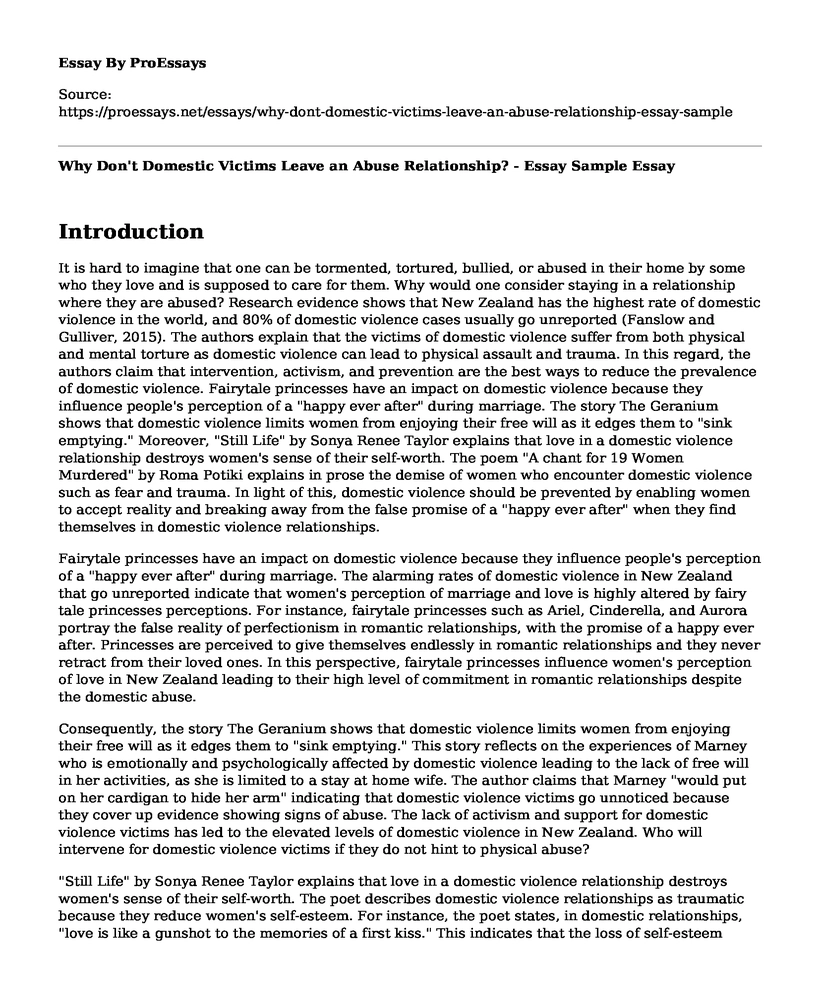Introduction
It is hard to imagine that one can be tormented, tortured, bullied, or abused in their home by some who they love and is supposed to care for them. Why would one consider staying in a relationship where they are abused? Research evidence shows that New Zealand has the highest rate of domestic violence in the world, and 80% of domestic violence cases usually go unreported (Fanslow and Gulliver, 2015). The authors explain that the victims of domestic violence suffer from both physical and mental torture as domestic violence can lead to physical assault and trauma. In this regard, the authors claim that intervention, activism, and prevention are the best ways to reduce the prevalence of domestic violence. Fairytale princesses have an impact on domestic violence because they influence people's perception of a "happy ever after" during marriage. The story The Geranium shows that domestic violence limits women from enjoying their free will as it edges them to "sink emptying." Moreover, "Still Life" by Sonya Renee Taylor explains that love in a domestic violence relationship destroys women's sense of their self-worth. The poem "A chant for 19 Women Murdered" by Roma Potiki explains in prose the demise of women who encounter domestic violence such as fear and trauma. In light of this, domestic violence should be prevented by enabling women to accept reality and breaking away from the false promise of a "happy ever after" when they find themselves in domestic violence relationships.
Fairytale princesses have an impact on domestic violence because they influence people's perception of a "happy ever after" during marriage. The alarming rates of domestic violence in New Zealand that go unreported indicate that women's perception of marriage and love is highly altered by fairy tale princesses perceptions. For instance, fairytale princesses such as Ariel, Cinderella, and Aurora portray the false reality of perfectionism in romantic relationships, with the promise of a happy ever after. Princesses are perceived to give themselves endlessly in romantic relationships and they never retract from their loved ones. In this perspective, fairytale princesses influence women's perception of love in New Zealand leading to their high level of commitment in romantic relationships despite the domestic abuse.
Consequently, the story The Geranium shows that domestic violence limits women from enjoying their free will as it edges them to "sink emptying." This story reflects on the experiences of Marney who is emotionally and psychologically affected by domestic violence leading to the lack of free will in her activities, as she is limited to a stay at home wife. The author claims that Marney "would put on her cardigan to hide her arm" indicating that domestic violence victims go unnoticed because they cover up evidence showing signs of abuse. The lack of activism and support for domestic violence victims has led to the elevated levels of domestic violence in New Zealand. Who will intervene for domestic violence victims if they do not hint to physical abuse?
"Still Life" by Sonya Renee Taylor explains that love in a domestic violence relationship destroys women's sense of their self-worth. The poet describes domestic violence relationships as traumatic because they reduce women's self-esteem. For instance, the poet states, in domestic relationships, "love is like a gunshot to the memories of a first kiss." This indicates that the loss of self-esteem limits women from seeking help when they are in abusive relationships. The poem "A Chant for 19 Women Murdered" by Roma Potiki explains in prose the demise of women who encounter domestic violence such as fear and trauma. The poet explains that women in domestic violence relationships suffer from physical abuse such as rape and violence. However, poet asserts that women in these relationships do not report domestic violence for fear of keeping their families together and providing financial security for their families because men are the breadwinners in most cases.
Conclusion
In general, the evidence provided in this paper shows that domestic violence should be prevented by enabling women to accept reality and breaking away from the false promise of a "happy ever after" when they find themselves in domestic violence relationships. Besides, women should seek economic freedom to help them seek independence in case they are in abusive relationships. Domestic violence activism and women empowerment programs should be promoted in New Zealand to enable women to achieve high levels of self-esteem. This will help them improve their level of intervention and help-seeking tendencies in case they are in abusive relationships.
References
Birnbaum, P. (2017). Women artists in interwar France: framing femininities. Routledge.
Fanslow, J., & Gulliver, P. (2015). Exploring risk and protective factors for recent and past intimate partner violence against New Zealand women. Violence and victims, 30(6), 960-983.
Mila, K. (2016). 'Mana Moana': Ancient resources for new stories. English in Aotearoa, (88), 31.
Thompson, C. (2009). Reading Patricia Grace. World Literature Today, 83(3), 37.
Cite this page
Why Don't Domestic Victims Leave an Abuse Relationship? - Essay Sample. (2022, Jun 05). Retrieved from https://proessays.net/essays/why-dont-domestic-victims-leave-an-abuse-relationship-essay-sample
If you are the original author of this essay and no longer wish to have it published on the ProEssays website, please click below to request its removal:
- Essay Example on Masculinity in Guyland: Toxic Behaviour Towards Women
- Research Paper on Disability Housing Discrimination: Illegal, Unfair, and Unacceptable
- Paper Example on Mental Health and Social Issues
- Essay on Bullying Within Friendships: An Analysis of Victimization Among Peers
- Culture a Key Factor in Violence Against Women: Patriarchy Promotes Abuse - Essay Sample
- Essay on Ethiopian Immigration to Washington D.C: A 20 Year Story
- U.S. Faces Evolving Terror Threat: 17 Years After Homeland Security - Essay Sample







